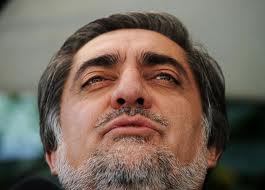A frontrunner to succeed Afghan President Hamid Karzai has said his one time rival should continue to serve a role in politics and that he wouldn't pursue "vengeance" against the man he claims stole the last election.

A former ophthalmologist and resistance fighter against invading Soviet forces in the 1980s, Abdullah Abdullah served as Karzai's foreign minister from late 2001 to 2005.
Following the 2009 poll, which was widely discredited as massively fraudulent by the international community, Abdullah accused Karzai of "stealing" the vote.
Abdullah along with former World Bank economist Ashraf Ghani are seen as the two leading candidates in the race to succeed Karzai, with more than seven million people defying bad weather and Taliban threats to vote last week.
Observers have long suspected Karzai of coveting a key role in the country's politics after leaving the presidency.
These suspicions have been fuelled, in part, by the construction of a lavish new house for him near the presidential palace and the nomination of his brother Qayyum as a candidate.
Though Qayyum dropped out of the race, and his next anointed successor, Zalmai Rasoul, is believed to have fallen into third place behind the two leaders, Karzai is still seen as important to Abdullah's effort to secure the president's southern Pashtun base, the largest ethnic group.
Abdullah, who was born to an ethnic Pashtun father and a Tajik mother, is more associated with the northern Tajiks.
Speaking to AFP in his Kabul home, Abdullah hinted Karzai would remain at the heart of the country's affairs.
"The president of Afghanistan will have a role in the future. I'm not talking about an administrative role, I'm talking about a role in the politics of the country, a role at the national level, and he has served the country for the past 13 years.
"So that is something that is natural. What shape that role will take will depend on his decision", he said.
Asked whether he would be inclined to seek prosecution of Karzai or his brothers, who have been dogged by major corruption allegations for years, he added: "I would not go through that line that will be politics of vengeance and revenge and retribution. Our priority of the future government will be to deal with the priorities of the nation."
- 'Rejection of Taliban' -
===========================
The first partial results are expected later Sunday, with both camps expressing optimism of winning outright without the need for a second round, triggered if no candidate gains more 50 percent of the estimated seven million votes cast.
A potential solution to accommodate Abdullah's "Pashtun problem" could be found in a switchover to a parliamentary-democracy he says he wants to create by changing the country's constitution.
"It will give the chance for better accountability, it will be good for the people's participation -- so that has been part of our agenda including bigger room, better room for the political parties," he said.
Such a setup would expand the powers of Afghanistan's parliament, creating new roles to accommodate potential allies.
Dressed in a smart grey suit Abdullah appeared confident that the prize that eluded him in 2009 was within his grasp on this occasion, adding that he isn't overly concerned so far about reports of fraud.
"We're watching it, we're monitoring it. There is a system and hopefully everybody tries to make the system work," he said.
Many critics have questioned whether Abdullah, who fought the Taliban when they were in power from 1996-2001, can accomplish his stated ambition of negotiating a settlement with the militants.
Responding to the doubts, he said: "I would say that the election has taken place already, that in itself was a rejection of the Talibanisation of the country and a rejection of violence.
"I hope that everyone has drawn the right lesson from the elections and they hopefully boost the legitimacy of the Afghan administration, and then the Afghan administration will be taken seriously by friends and foes alike."
And he remained insistent that, unlike Karzai, who has been accused of backsliding on human rights issues, he would make no such concessions to hardliners, particularly with regard to women's rights.
"Compromising fundamental values is out of the question. These are values for which are people have made sacrifices for and these are achievements of the people of Afghanistan.
"Making sacrifices is one thing but to sacrifice the rights of the people under any illusion of achieving peace will not achieve any peace."
AFP
Tags
Your Comment